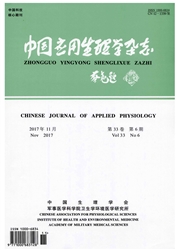

 中文摘要:
中文摘要:
目的:探讨百草枯(PQ)对活性氧类物质(ROS)和中性粒细胞凋亡的影响及可能机制。方法:离体培养健康成人中性粒细胞,给予不同浓度百草枯刺激后培养6~24 h,流式细胞仪检测中性粒细胞凋亡率及ROS含量,Western blot检测信号蛋白核因子kappa B(NF-кB)、天冬氨酸特异性半胱氨酸蛋白酶3(Caspase 3);给予ROS、NF-κB拮抗剂后,再次检测中性粒细胞凋亡率及信号蛋白含量。结果:PQ可明显促进ROS产生及抑制中性粒细胞凋亡,这种效应可被ROS抑制剂二联苯碘(DPI)及NF-кB抑制剂四氢吡咯二硫代氨基甲酯(PDTC)逆转。同时,PQ能促进NF-κB表达增加,而Caspase 3表达则受到明显抑制。结论:百草枯是强力的ROS诱导剂,并能抑制中性粒细胞凋亡,其机制可能与NF-κB活化,进而抑制Caspase 3表达有关。
 英文摘要:
英文摘要:
Objective: To investigate the effect of paraquat(PQ) on reactive oxygen species(ROS) and neutrophil apoptosis and its possi- ble signal transductian pathways. Methods: Cultm'ed neutrophils were treated with different concentrations of PQ for 6 ~ 24 h. The apoptosis rate of neutrophils and ROS content were determined by flow cytometry. The exoressions of nuclear factor kappa B (NF-KB) and Caspase 3 were detected by Western blot. These parameters were checked again after NF-KB and Caspase 3 antagonist were applied. Results: PQ could boost ROS generation and depress neutrophil apoptosis significantly. At the same time PQ could enhance the expression of NF-KB and inhibit the expression of Caspase 3. These effects could be reversed by ROS inhibitor diphenyleneiodonium (DPI) and NF-KB inhibitor pyrro- lidinedithiocarbamate(PDTC). Conclusion: PQ is a potent inducer of ROS and can inhibit neutrophil apoptosis by activating NF-KB and sur- pressing Caspase 3 activity.
 同期刊论文项目
同期刊论文项目
 同项目期刊论文
同项目期刊论文
 期刊信息
期刊信息
